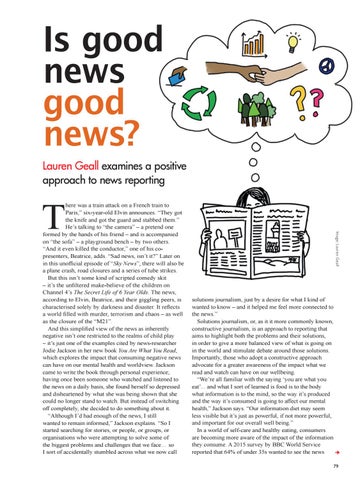Is good news good news? Lauren Geall examines a positive approach to news reporting
Image: Lauren Geall
T
here was a train attack on a French train to Paris,” six-year-old Elvin announces. “They got the knife and got the guard and stabbed them.” He’s talking to “the camera” – a pretend one formed by the hands of his friend – and is accompanied on “the sofa” – a playground bench – by two others. “And it even killed the conductor,” one of his copresenters, Beatrice, adds. “Sad news, isn’t it?” Later on in this unofficial episode of “Sky News”, there will also be a plane crash, road closures and a series of tube strikes. But this isn’t some kind of scripted comedy skit – it’s the unfiltered make-believe of the children on Channel 4’s The Secret Life of 6 Year Olds. The news, according to Elvin, Beatrice, and their giggling peers, is characterised solely by darkness and disaster. It reflects a world filled with murder, terrorism and chaos – as well as the closure of the “M21”. And this simplified view of the news as inherently negative isn’t one restricted to the realms of child play – it’s just one of the examples cited by news-researcher Jodie Jackson in her new book You Are What You Read, which explores the impact that consuming negative news can have on our mental health and worldview. Jackson came to write the book through personal experience; having once been someone who watched and listened to the news on a daily basis, she found herself so depressed and disheartened by what she was being shown that she could no longer stand to watch. But instead of switching off completely, she decided to do something about it. “Although I’d had enough of the news, I still wanted to remain informed,” Jackson explains. “So I started searching for stories, or people, or groups, or organisations who were attempting to solve some of the biggest problems and challenges that we face… so I sort of accidentally stumbled across what we now call
solutions journalism, just by a desire for what I kind of wanted to know – and it helped me feel more connected to the news.” Solutions journalism, or, as it it more commonly known, constructive journalism, is an approach to reporting that aims to highlight both the problems and their solutions, in order to give a more balanced view of what is going on in the world and stimulate debate around those solutions. Importantly, those who adopt a constructive approach advocate for a greater awareness of the impact what we read and watch can have on our wellbeing. “We’re all familiar with the saying ‘you are what you eat’... and what I sort of learned is food is to the body what information is to the mind, so the way it’s produced and the way it’s consumed is going to affect our mental health,” Jackson says. “Our information diet may seem less visible but it’s just as powerful, if not more powerful, and important for our overall well being.” In a world of self-care and healthy eating, consumers are becoming more aware of the impact of the information they consume. A 2015 survey by BBC World Service reported that 64% of under 35s wanted to see the news 79
